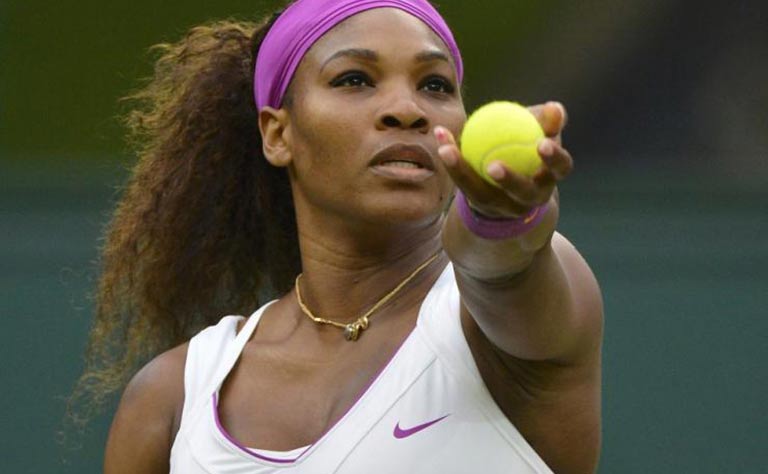It will be the 36-year-old American's first grand slam final since the 2017 Australian Open, where she won her 23rd major title, before taking maternity leave to give birth to a daughter last year.
Four breaks of serve were enough to see Williams through to the final in 70 minutes as Goerges was overwhelmed by the seven-time champion's powerful groundstrokes.
Williams goes on to meet Kerber - who conquered Jelena Ostapenko 6-3, 6-3 earlier on Thursday - in a repeat of the 2016 final, which Williams won in straight sets.
"Serena is one of the best players in the world," said Kerber.
"We had so many great matches in the last years. It's great to see her back. I know that she is always pushing you to the limits to play your best tennis. This is the only chance to beat her."
At the age of 29, Goerges was competing in her maiden semi-final of a grand slam hoping to set up an all-German women's final with compatriot Kerber for the first time ever at Wimbledon.
However, Williams used all her strength and experience to prevail with a 10th semi-final success at the Championships, having only been beaten once at this stage in her career.
Goerges started well to keep Williams at bay on serve as the opening four games looked evenly-matched, and statistics showed they were the top two leading women for the most aces in the tournament.
But Williams would eventually break through in the sixth game for a 4-2 lead as Goerges dropped a forehand wide.
Williams then powered her way through an exhilarating exchange to claim the first set.
Another break soon followed in the second set with Goerges' attempt at a short slice winner falling short.
Goerges managed to get a break of her own as she diced Williams' chance to serve out the match.
But three errors on Goerges' delivery, culminating in a double-fault, opened match point for Williams and a desperate lob sailed long to confirm her return to Wimbledon's main stage.
It will be a 30th appearance for Williams in major finals and she will have the chance to equal Australian Margaret Court's all-time record of 24 wins with another triumph.
Germany’s Kerber is through to her second Wimbledon final after a commanding victory over Latvian Jelena Ostapenko in her semi-final.
The 21-year-old Ostapenko was in her first final-four clash at Wimbledon and the pressure of the occasion clearly overwhelmed her as she made 36 unforced errors to concede defeat in 67 minutes on Centre Court.
"I think she (Ostapenko) is a player who is trying to being aggressive from the first point," she said.
"For me it was important to move well, be patient, and also take my chances when I have the chance to step in and be aggressive. I think that was the key."
The young 2017 French Open champion was far too eager and erratic in her attempts to hit winners, and even though she hit 30 of them in the match, the errors she made outweighed them.
Kerber, who won two grand slam titles at the Australian Open and US Open in 2016, was calm and collected throughout as she produced clean winners in the rallies and stood behind a firm serve to claim a deserved win.
Ostapenko capitulated in the second set and her 25th unforced error fell into the net to hand Kerber a break as she pulled away to lead 3-0.
Even though Ostapenko rallied to delay defeat with her first break-point winner, Kerber outclassed her in a lengthy rally and earned a second chance to play for the Venus Rosewater Dish in Saturday's showpiece.
Kerber is now in her fourth final at a grand slam event and will face Williams for the third time in a major decider on Saturday.
Four breaks of serve were enough to see Williams through to the final in 70 minutes as Goerges was overwhelmed by the seven-time champion's powerful groundstrokes.
Williams goes on to meet Kerber - who conquered Jelena Ostapenko 6-3, 6-3 earlier on Thursday - in a repeat of the 2016 final, which Williams won in straight sets.
"Serena is one of the best players in the world," said Kerber.
"We had so many great matches in the last years. It's great to see her back. I know that she is always pushing you to the limits to play your best tennis. This is the only chance to beat her."
At the age of 29, Goerges was competing in her maiden semi-final of a grand slam hoping to set up an all-German women's final with compatriot Kerber for the first time ever at Wimbledon.
However, Williams used all her strength and experience to prevail with a 10th semi-final success at the Championships, having only been beaten once at this stage in her career.
Goerges started well to keep Williams at bay on serve as the opening four games looked evenly-matched, and statistics showed they were the top two leading women for the most aces in the tournament.
But Williams would eventually break through in the sixth game for a 4-2 lead as Goerges dropped a forehand wide.
Williams then powered her way through an exhilarating exchange to claim the first set.
Another break soon followed in the second set with Goerges' attempt at a short slice winner falling short.
Goerges managed to get a break of her own as she diced Williams' chance to serve out the match.
But three errors on Goerges' delivery, culminating in a double-fault, opened match point for Williams and a desperate lob sailed long to confirm her return to Wimbledon's main stage.
It will be a 30th appearance for Williams in major finals and she will have the chance to equal Australian Margaret Court's all-time record of 24 wins with another triumph.
Germany’s Kerber is through to her second Wimbledon final after a commanding victory over Latvian Jelena Ostapenko in her semi-final.
The 21-year-old Ostapenko was in her first final-four clash at Wimbledon and the pressure of the occasion clearly overwhelmed her as she made 36 unforced errors to concede defeat in 67 minutes on Centre Court.
"I think she (Ostapenko) is a player who is trying to being aggressive from the first point," she said.
"For me it was important to move well, be patient, and also take my chances when I have the chance to step in and be aggressive. I think that was the key."
The young 2017 French Open champion was far too eager and erratic in her attempts to hit winners, and even though she hit 30 of them in the match, the errors she made outweighed them.
Kerber, who won two grand slam titles at the Australian Open and US Open in 2016, was calm and collected throughout as she produced clean winners in the rallies and stood behind a firm serve to claim a deserved win.
Ostapenko capitulated in the second set and her 25th unforced error fell into the net to hand Kerber a break as she pulled away to lead 3-0.
Even though Ostapenko rallied to delay defeat with her first break-point winner, Kerber outclassed her in a lengthy rally and earned a second chance to play for the Venus Rosewater Dish in Saturday's showpiece.
Kerber is now in her fourth final at a grand slam event and will face Williams for the third time in a major decider on Saturday.









 Home
Home Politics
Politics











